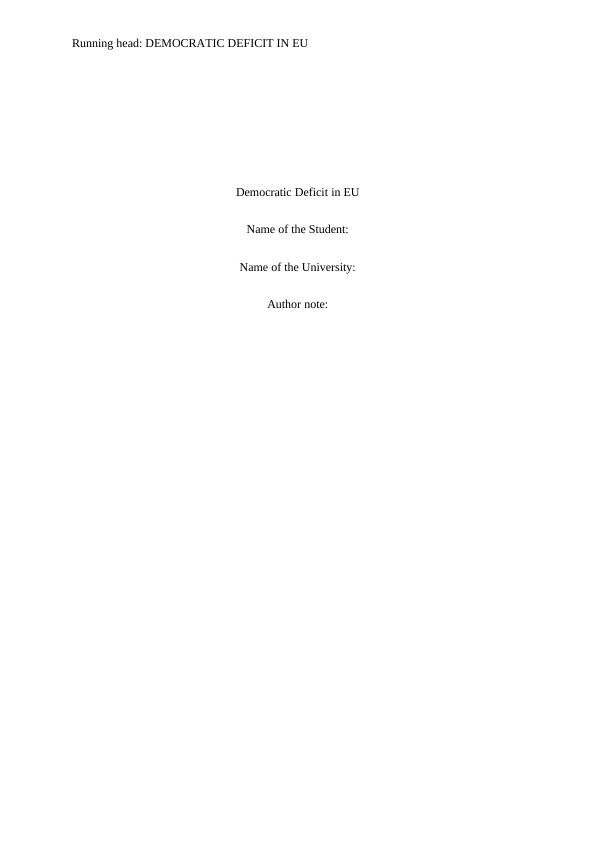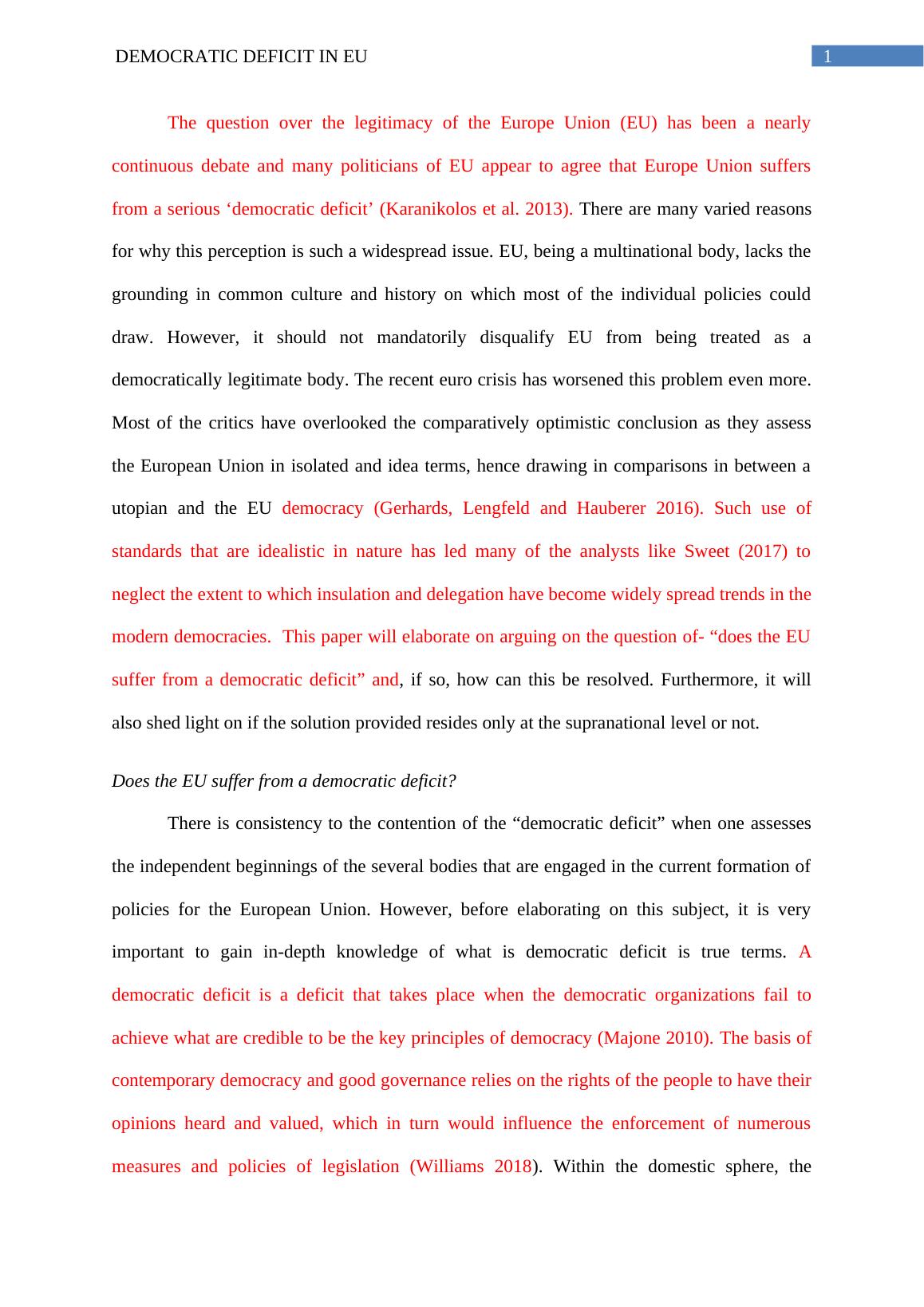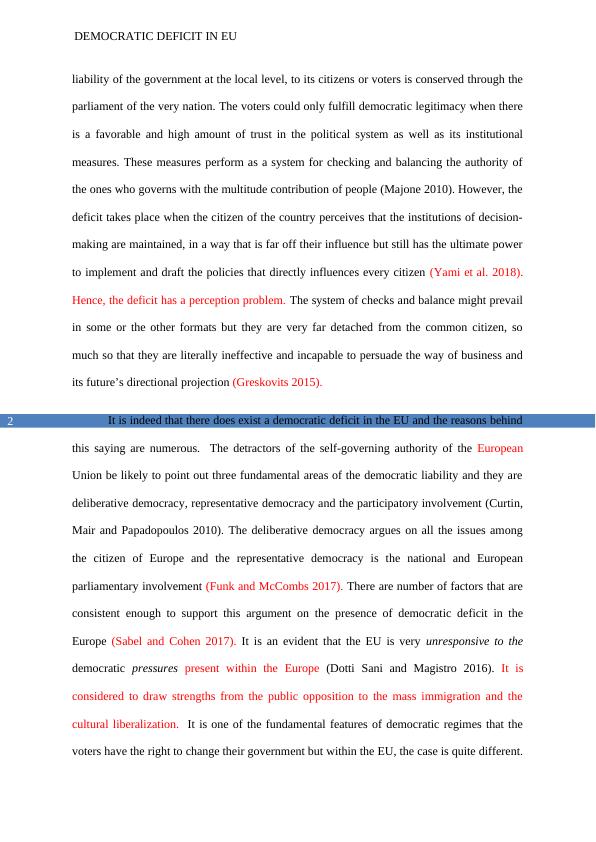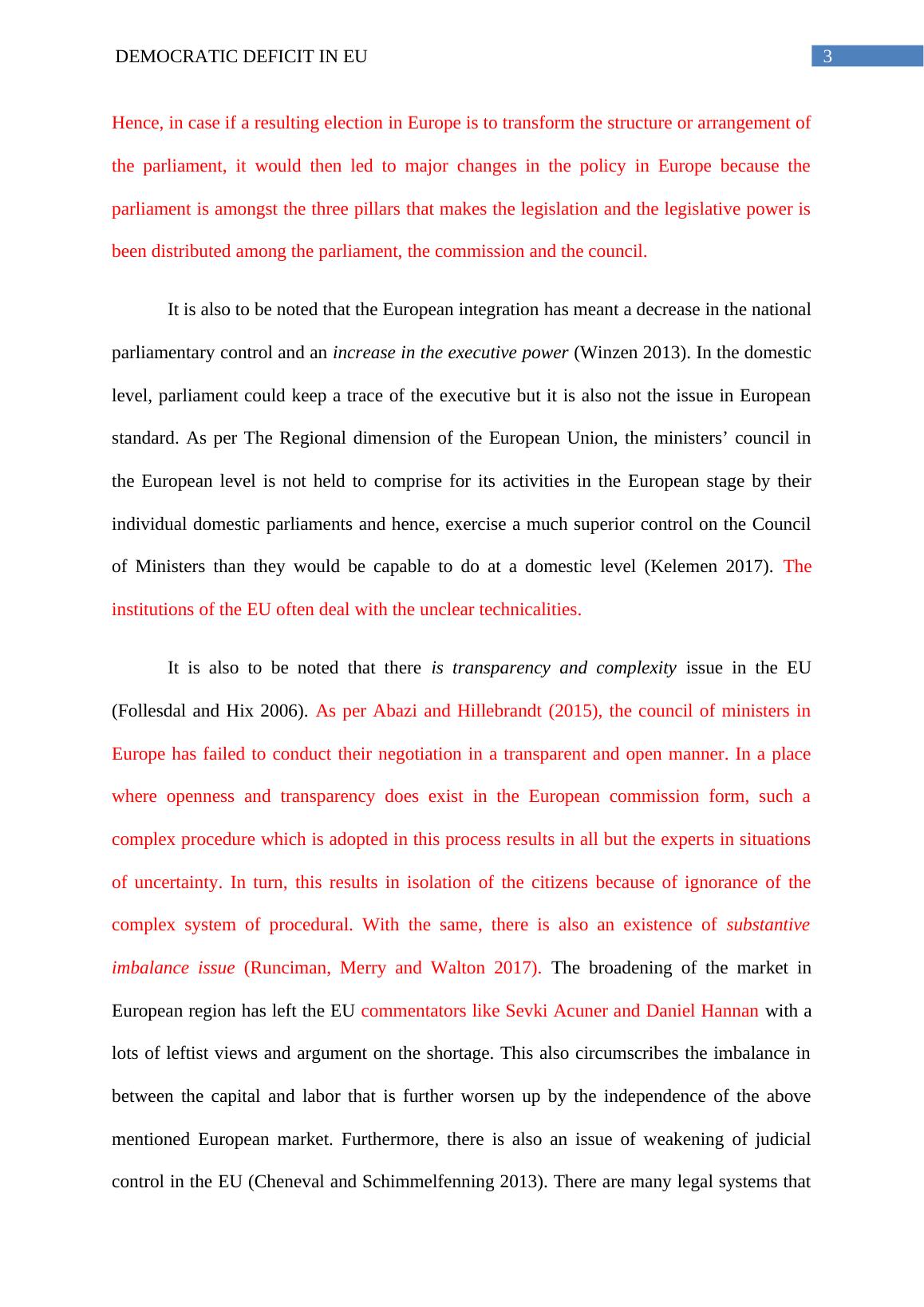The Democratic Deficit in the European Union (EU)
13 Pages4198 Words18 Views
Added on 2021-06-17
The Democratic Deficit in the European Union (EU)
Added on 2021-06-17
ShareRelated Documents
Running head: DEMOCRATIC DEFICIT IN EU
Democratic Deficit in EU
Name of the Student:
Name of the University:
Author note:
Democratic Deficit in EU
Name of the Student:
Name of the University:
Author note:

DEMOCRATIC DEFICIT IN EU
1
The question over the legitimacy of the Europe Union (EU) has been a nearly
continuous debate and many politicians of EU appear to agree that Europe Union suffers
from a serious ‘democratic deficit’ (Karanikolos et al. 2013). There are many varied reasons
for why this perception is such a widespread issue. EU, being a multinational body, lacks the
grounding in common culture and history on which most of the individual policies could
draw. However, it should not mandatorily disqualify EU from being treated as a
democratically legitimate body. The recent euro crisis has worsened this problem even more.
Most of the critics have overlooked the comparatively optimistic conclusion as they assess
the European Union in isolated and idea terms, hence drawing in comparisons in between a
utopian and the EU democracy (Gerhards, Lengfeld and Hauberer 2016). Such use of
standards that are idealistic in nature has led many of the analysts like Sweet (2017) to
neglect the extent to which insulation and delegation have become widely spread trends in the
modern democracies. This paper will elaborate on arguing on the question of- “does the EU
suffer from a democratic deficit” and, if so, how can this be resolved. Furthermore, it will
also shed light on if the solution provided resides only at the supranational level or not.
Does the EU suffer from a democratic deficit?
There is consistency to the contention of the “democratic deficit” when one assesses
the independent beginnings of the several bodies that are engaged in the current formation of
policies for the European Union. However, before elaborating on this subject, it is very
important to gain in-depth knowledge of what is democratic deficit is true terms. A
democratic deficit is a deficit that takes place when the democratic organizations fail to
achieve what are credible to be the key principles of democracy (Majone 2010). The basis of
contemporary democracy and good governance relies on the rights of the people to have their
opinions heard and valued, which in turn would influence the enforcement of numerous
measures and policies of legislation (Williams 2018). Within the domestic sphere, the
1
The question over the legitimacy of the Europe Union (EU) has been a nearly
continuous debate and many politicians of EU appear to agree that Europe Union suffers
from a serious ‘democratic deficit’ (Karanikolos et al. 2013). There are many varied reasons
for why this perception is such a widespread issue. EU, being a multinational body, lacks the
grounding in common culture and history on which most of the individual policies could
draw. However, it should not mandatorily disqualify EU from being treated as a
democratically legitimate body. The recent euro crisis has worsened this problem even more.
Most of the critics have overlooked the comparatively optimistic conclusion as they assess
the European Union in isolated and idea terms, hence drawing in comparisons in between a
utopian and the EU democracy (Gerhards, Lengfeld and Hauberer 2016). Such use of
standards that are idealistic in nature has led many of the analysts like Sweet (2017) to
neglect the extent to which insulation and delegation have become widely spread trends in the
modern democracies. This paper will elaborate on arguing on the question of- “does the EU
suffer from a democratic deficit” and, if so, how can this be resolved. Furthermore, it will
also shed light on if the solution provided resides only at the supranational level or not.
Does the EU suffer from a democratic deficit?
There is consistency to the contention of the “democratic deficit” when one assesses
the independent beginnings of the several bodies that are engaged in the current formation of
policies for the European Union. However, before elaborating on this subject, it is very
important to gain in-depth knowledge of what is democratic deficit is true terms. A
democratic deficit is a deficit that takes place when the democratic organizations fail to
achieve what are credible to be the key principles of democracy (Majone 2010). The basis of
contemporary democracy and good governance relies on the rights of the people to have their
opinions heard and valued, which in turn would influence the enforcement of numerous
measures and policies of legislation (Williams 2018). Within the domestic sphere, the

DEMOCRATIC DEFICIT IN EU
2
liability of the government at the local level, to its citizens or voters is conserved through the
parliament of the very nation. The voters could only fulfill democratic legitimacy when there
is a favorable and high amount of trust in the political system as well as its institutional
measures. These measures perform as a system for checking and balancing the authority of
the ones who governs with the multitude contribution of people (Majone 2010). However, the
deficit takes place when the citizen of the country perceives that the institutions of decision-
making are maintained, in a way that is far off their influence but still has the ultimate power
to implement and draft the policies that directly influences every citizen (Yami et al. 2018).
Hence, the deficit has a perception problem. The system of checks and balance might prevail
in some or the other formats but they are very far detached from the common citizen, so
much so that they are literally ineffective and incapable to persuade the way of business and
its future’s directional projection (Greskovits 2015).
It is indeed that there does exist a democratic deficit in the EU and the reasons behind
this saying are numerous. The detractors of the self-governing authority of the European
Union be likely to point out three fundamental areas of the democratic liability and they are
deliberative democracy, representative democracy and the participatory involvement (Curtin,
Mair and Papadopoulos 2010). The deliberative democracy argues on all the issues among
the citizen of Europe and the representative democracy is the national and European
parliamentary involvement (Funk and McCombs 2017). There are number of factors that are
consistent enough to support this argument on the presence of democratic deficit in the
Europe (Sabel and Cohen 2017). It is an evident that the EU is very unresponsive to the
democratic pressures present within the Europe (Dotti Sani and Magistro 2016). It is
considered to draw strengths from the public opposition to the mass immigration and the
cultural liberalization. It is one of the fundamental features of democratic regimes that the
voters have the right to change their government but within the EU, the case is quite different.
2
liability of the government at the local level, to its citizens or voters is conserved through the
parliament of the very nation. The voters could only fulfill democratic legitimacy when there
is a favorable and high amount of trust in the political system as well as its institutional
measures. These measures perform as a system for checking and balancing the authority of
the ones who governs with the multitude contribution of people (Majone 2010). However, the
deficit takes place when the citizen of the country perceives that the institutions of decision-
making are maintained, in a way that is far off their influence but still has the ultimate power
to implement and draft the policies that directly influences every citizen (Yami et al. 2018).
Hence, the deficit has a perception problem. The system of checks and balance might prevail
in some or the other formats but they are very far detached from the common citizen, so
much so that they are literally ineffective and incapable to persuade the way of business and
its future’s directional projection (Greskovits 2015).
It is indeed that there does exist a democratic deficit in the EU and the reasons behind
this saying are numerous. The detractors of the self-governing authority of the European
Union be likely to point out three fundamental areas of the democratic liability and they are
deliberative democracy, representative democracy and the participatory involvement (Curtin,
Mair and Papadopoulos 2010). The deliberative democracy argues on all the issues among
the citizen of Europe and the representative democracy is the national and European
parliamentary involvement (Funk and McCombs 2017). There are number of factors that are
consistent enough to support this argument on the presence of democratic deficit in the
Europe (Sabel and Cohen 2017). It is an evident that the EU is very unresponsive to the
democratic pressures present within the Europe (Dotti Sani and Magistro 2016). It is
considered to draw strengths from the public opposition to the mass immigration and the
cultural liberalization. It is one of the fundamental features of democratic regimes that the
voters have the right to change their government but within the EU, the case is quite different.

DEMOCRATIC DEFICIT IN EU
3
Hence, in case if a resulting election in Europe is to transform the structure or arrangement of
the parliament, it would then led to major changes in the policy in Europe because the
parliament is amongst the three pillars that makes the legislation and the legislative power is
been distributed among the parliament, the commission and the council.
It is also to be noted that the European integration has meant a decrease in the national
parliamentary control and an increase in the executive power (Winzen 2013). In the domestic
level, parliament could keep a trace of the executive but it is also not the issue in European
standard. As per The Regional dimension of the European Union, the ministers’ council in
the European level is not held to comprise for its activities in the European stage by their
individual domestic parliaments and hence, exercise a much superior control on the Council
of Ministers than they would be capable to do at a domestic level (Kelemen 2017). The
institutions of the EU often deal with the unclear technicalities.
It is also to be noted that there is transparency and complexity issue in the EU
(Follesdal and Hix 2006). As per Abazi and Hillebrandt (2015), the council of ministers in
Europe has failed to conduct their negotiation in a transparent and open manner. In a place
where openness and transparency does exist in the European commission form, such a
complex procedure which is adopted in this process results in all but the experts in situations
of uncertainty. In turn, this results in isolation of the citizens because of ignorance of the
complex system of procedural. With the same, there is also an existence of substantive
imbalance issue (Runciman, Merry and Walton 2017). The broadening of the market in
European region has left the EU commentators like Sevki Acuner and Daniel Hannan with a
lots of leftist views and argument on the shortage. This also circumscribes the imbalance in
between the capital and labor that is further worsen up by the independence of the above
mentioned European market. Furthermore, there is also an issue of weakening of judicial
control in the EU (Cheneval and Schimmelfenning 2013). There are many legal systems that
3
Hence, in case if a resulting election in Europe is to transform the structure or arrangement of
the parliament, it would then led to major changes in the policy in Europe because the
parliament is amongst the three pillars that makes the legislation and the legislative power is
been distributed among the parliament, the commission and the council.
It is also to be noted that the European integration has meant a decrease in the national
parliamentary control and an increase in the executive power (Winzen 2013). In the domestic
level, parliament could keep a trace of the executive but it is also not the issue in European
standard. As per The Regional dimension of the European Union, the ministers’ council in
the European level is not held to comprise for its activities in the European stage by their
individual domestic parliaments and hence, exercise a much superior control on the Council
of Ministers than they would be capable to do at a domestic level (Kelemen 2017). The
institutions of the EU often deal with the unclear technicalities.
It is also to be noted that there is transparency and complexity issue in the EU
(Follesdal and Hix 2006). As per Abazi and Hillebrandt (2015), the council of ministers in
Europe has failed to conduct their negotiation in a transparent and open manner. In a place
where openness and transparency does exist in the European commission form, such a
complex procedure which is adopted in this process results in all but the experts in situations
of uncertainty. In turn, this results in isolation of the citizens because of ignorance of the
complex system of procedural. With the same, there is also an existence of substantive
imbalance issue (Runciman, Merry and Walton 2017). The broadening of the market in
European region has left the EU commentators like Sevki Acuner and Daniel Hannan with a
lots of leftist views and argument on the shortage. This also circumscribes the imbalance in
between the capital and labor that is further worsen up by the independence of the above
mentioned European market. Furthermore, there is also an issue of weakening of judicial
control in the EU (Cheneval and Schimmelfenning 2013). There are many legal systems that

End of preview
Want to access all the pages? Upload your documents or become a member.
Related Documents
Provisions on Democratic Principles of the Lisbon Treatylg...
|7
|2335
|50
Impact of European Integration on National Parliamentslg...
|7
|2181
|53
Is the USA still the World's Superpower? A Case for Rising Superpowerslg...
|15
|1228
|204
Duties of members of Congress and the Electoral Collegelg...
|4
|935
|75
